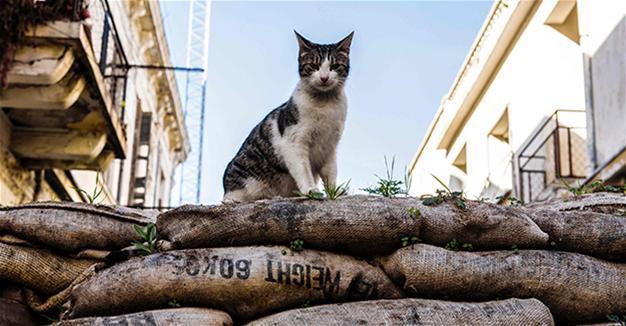Turkish Cypriots push private sector despite embargo
FAMAGUSTA - Agence France-Presse

AFP photo
With its pristine floor tiles and colorful storefronts, Famagusta’s new City Mall symbolizes efforts by the northern part of divided Cyprus to encourage investment despite a decades-long trade embargo.
Like many projects in the Mediterranean island’s north, the mall’s backers received tax breaks from a government keen to boost the economy and become less dependent on Turkey.
The breakaway Turkish Republic of Northern Cyprus is cut off from trade with Europe.
Self-declared in 1983, covering a third of the island’s land mass and home to 300,000 people, it has no direct air or sea links with any country except Turkey.
All of its imports, exports and even the post must pass through its neighbor to the north.
Mustafa Besim, a professor at Famagusta’s Eastern Mediterranean University, said the territory was keen to reduce its dependence on Ankara, which finances more than a third of its budget.
“People have understood that if you are... so much financially dependent on another economy, it has other implications, both economical and political,” he said.
Cheap loans, tax breaks offered
Keen to boost the private sector, in recent years the government has offered investors cheap loans and tax breaks aimed at spurring investment.
“In 2009... there wasn’t any program, any support, nothing related to supporting small and medium enterprises, shopkeepers, no financial program, nothing,” the minister for the economy and energy, Sunat Atun, told AFP.
He said the government began offering interest-free loans to manufacturers and later expanded the program to other sectors.
“We give them some time and space to ensure they will start to have some returns,” Atun said.
The Tarimer family, whose Elektrokur firm invested some $21 million (20 million euros) in the City Mall, took advantage of a tax break on construction materials.
“This helped us, given the size of the investment,” Hasan Sarı, the mall’s general manager, told AFP.
Standing outside one of the mall’s 45 stores, he said he wanted to encourage Turkish Cypriots to shop locally rather than taking trips abroad to do so.
“The idea was to bring together in one place everything that interests a family, to encourage them to consume here and nurture our economy,” he said.
But for other key sectors such as tourism and higher education to attract investment, they must overcome the Turkish Cypriots’ isolation.
“The government has been giving a lot of incentives,” said Besim.
“They include renting land to investors with no charges, exempting them from taxes and funding opportunities given by the development bank.”
“Universities are being given subsidies to invite international organizations, to get a reputation.”
Officials say the strategy is bearing fruit. In 2016, more than a million visitors came, and tourism revenues topped a fifth of government income.
Luxury hotels and casinos have mushroomed along the island’s north coast, attracting both foreign tourists and local visitors.
The territory’s student population has also tripled since 2009 -- some 80,000 foreign students now attend its universities.
Embargo remains major brake
But the embargo remains a major brake on economic development. It stands little chance of being lifted until Greek Cypriots and Turkish Cypriots reach a peace deal.
Greek Cyprus President Nicos Anastasiades, who will meet United Nations head Antonio Guterres on March 22, said he would convey “the absolute will of Greek Cypriot side to continue a dialogue” after peace talks collapsed in February.
But Besim said the authorities in the north could still take interim measures to support the economy.
“This government should continue paying attention to fiscal discipline,” he said.
“Turkish Cypriots are now trying to be more autonomous and to generate revenues that are enough for their expenditures.”
